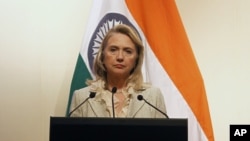NEW DELHI - Secretary of State Hillary Clinton has wrapped up her visit to India with a wide-ranging discussion of mutual strategic issues. The discussions Tuesday ranged from Iranian oil to Pakistani counter-terror efforts.
Clinton praised India Tuesday for its gradual reduction in oil imports from Iran, saying such decisions create leverage for the international community to slow Teheran's nuclear weapons development.
"I welcome the progress India is making to reduce its purchases of oil from Iran and hope to see continuing progress, because we don't believe Iran would be back at the negotiating table unless there had been the unrelenting pressure of international sanctions," Clinton said.
Addressing the media alongside Clinton in a joint news conference, Indian Foreign Minister S.M. Krishna was careful to avoid characterizing the oil import reductions as a punitive step against Iran. Instead, he framed the framed the reduction as a business-oriented decision spearheaded by oil industry executives.
"Given our growing demand, it is natural for us to try and diversify our sources of imports of oil and gas to meet the objectives of energy security," Krishna said. "Ultimately it reflects the decision that refineries make based on commercial, financial and technical considerations."
India has a complex and generally favorable relationship with Iran, based on centuries of shared culture, religion and civilization.
Krishna repeated India's policy Tuesday that Iran has the right to peaceful nuclear power use, but reminded Iran to live up to its obligations under the Nuclear Nonproliferation Treaty not to become a nuclear weapons state.
Secretary Clinton repeated the United States offer of a $10 million bounty for information leading to the arrest of suspected Pakistani terrorist Hafiz Saeed, who Washington says had a major hand in planning deadly 2008 attacks in Mumbai. Saeed is living openly in Pakistan.
Clinton says Pakistan's people deserve stronger anti-terror efforts from their government.
"We look to the government of Pakistan to do more," she said. "It needs to make sure that its territory is not used as launching pads for terrorist attacks anywhere including inside of Pakistan. It's very much about the people of Pakistan and their right to go to a market or go to a mosque, to live their lives and we need stronger, more concerted efforts."
The two chief diplomats also discussed a major sticking point in civil nuclear energy cooperation -- an Indian law passed two years ago demanding heavy liability payments from nuclear equipment manufacturers in the event of an accident. Krishna promised to address U.S. complaints that the law biases India's market against private American enterprises and in favor of heavily subsidized, government-owned nuclear companies in other countries.
"I assured her of India's commitment to provide a level playing field to all U.S. companies, within the framework of national law and of our international legal obligations," Krishna said.
The foreign minister's meeting is a prologue to a strategic forum scheduled to be held in Washington next month. The two countries are expected to reaffirm their partnership on stability in Afghanistan following a 2014 U.S. military pullout, and on joint counter-terror efforts.
Clinton praised India Tuesday for its gradual reduction in oil imports from Iran, saying such decisions create leverage for the international community to slow Teheran's nuclear weapons development.
"I welcome the progress India is making to reduce its purchases of oil from Iran and hope to see continuing progress, because we don't believe Iran would be back at the negotiating table unless there had been the unrelenting pressure of international sanctions," Clinton said.
Addressing the media alongside Clinton in a joint news conference, Indian Foreign Minister S.M. Krishna was careful to avoid characterizing the oil import reductions as a punitive step against Iran. Instead, he framed the framed the reduction as a business-oriented decision spearheaded by oil industry executives.
"Given our growing demand, it is natural for us to try and diversify our sources of imports of oil and gas to meet the objectives of energy security," Krishna said. "Ultimately it reflects the decision that refineries make based on commercial, financial and technical considerations."
India has a complex and generally favorable relationship with Iran, based on centuries of shared culture, religion and civilization.
Krishna repeated India's policy Tuesday that Iran has the right to peaceful nuclear power use, but reminded Iran to live up to its obligations under the Nuclear Nonproliferation Treaty not to become a nuclear weapons state.
Secretary Clinton repeated the United States offer of a $10 million bounty for information leading to the arrest of suspected Pakistani terrorist Hafiz Saeed, who Washington says had a major hand in planning deadly 2008 attacks in Mumbai. Saeed is living openly in Pakistan.
Clinton says Pakistan's people deserve stronger anti-terror efforts from their government.
"We look to the government of Pakistan to do more," she said. "It needs to make sure that its territory is not used as launching pads for terrorist attacks anywhere including inside of Pakistan. It's very much about the people of Pakistan and their right to go to a market or go to a mosque, to live their lives and we need stronger, more concerted efforts."
The two chief diplomats also discussed a major sticking point in civil nuclear energy cooperation -- an Indian law passed two years ago demanding heavy liability payments from nuclear equipment manufacturers in the event of an accident. Krishna promised to address U.S. complaints that the law biases India's market against private American enterprises and in favor of heavily subsidized, government-owned nuclear companies in other countries.
"I assured her of India's commitment to provide a level playing field to all U.S. companies, within the framework of national law and of our international legal obligations," Krishna said.
The foreign minister's meeting is a prologue to a strategic forum scheduled to be held in Washington next month. The two countries are expected to reaffirm their partnership on stability in Afghanistan following a 2014 U.S. military pullout, and on joint counter-terror efforts.




